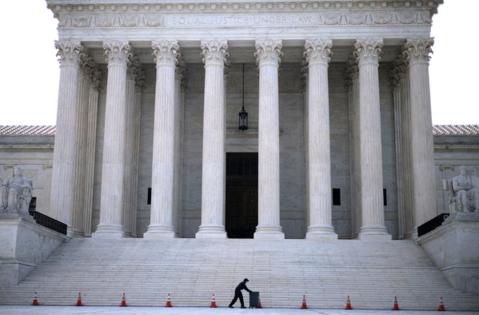Supreme Court asked to hear challenge to Trump's global tariffs
Published in News & Features
WASHINGTON — Two family-owned toy companies are asking the U.S. Supreme Court to consider striking down many of President Donald Trump’s sweeping tariffs, putting a high-stakes fight with worldwide economic implications before the justices for the first time.
The request filed Tuesday seeks to put the case on an expedited track with the possibility of a definitive Supreme Court ruling by the end of the year. The filing asks the justices to take the unusual step of considering the case without waiting for a federal appeals court to rule.
Learning Resources Inc. and hand2mind Inc. said the issue of Trump’s tariff authority under the 1977 International Emergency Economic Powers Act is so economically weighty that the justices should intervene immediately.
“In light of the tariffs’ massive impact on virtually every business and consumer across the nation, and the unremitting whiplash caused by the unfettered tariffing power the president claims, challenges to the IEEPA tariffs cannot await the normal appellate process,” the Chicago-area companies argued.
A federal appeals court in a separate case has said the tariffs could stay in effect until that panel hears arguments July 31.
Trump has portrayed tariffs as critical to leveling the playing field for American businesses and workers amid chronic trade deficits.
“The Trump administration is legally using the powers granted to the executive branch by the Constitution and Congress to address our country’s national emergencies of persistent goods trade deficits and drug trafficking,” White House spokesman Kush Desai said. “If the Supreme Court decides to hear this unfounded legal challenge, we look forward to ultimately prevailing.”
The filing comes in what until now had been a relatively low-profile case. U.S. District Judge Rudolph Contreras in Washington said Trump exceeded his authority under IEEPA, though the judge limited the May 29 ruling to the two companies pressing the suit.
Fast track
The Trump administration then appealed, and the companies are now asking the Supreme Court to directly review Contreras’ ruling. The companies suggested the justices decide before their summer recess starts in about two weeks whether to hear the case, with arguments in September or October.
The U.S. Court of International Trade declared Trump’s global tariffs unlawful in May in a separate case that also centers on the president’s powers under IEEPA. The law says the president may “regulate” the “importation” of property when needed to “deal with” an emergency.
Contreras said that language doesn’t authorize the president to impose import taxes. “The power to regulate is not the power to tax,” he wrote.
Both court clashes cover Trump’s April 2 “Liberation Day” tariffs — which combine a universal baseline levy of 10% with potentially much bigger rates for various trading partners.
Each suit also concerns separate import taxes over fentanyl trafficking. The toy-company case challenges trafficking tariffs imposed against China, while the Court of International Trade case also concerns similar taxes on imports from Canada and Mexico.
Supply chain
The toy companies’ chief executive officer, Rick Woldenberg, said in an interview that his businesses were now having to devote 30% of their office staff to navigating tariff issues.
“We’ve had extraordinary expenses, dramatically shifting our supply chain basically overnight — a supply chain we built over 40 years,” he said. “I feel like a refugee from a war, where we’re sort of loading everything up in the donkey cart and going to a safer place, not really knowing if the safer place we’re going to is really safe.”
The April 2 tariffs represented the biggest increase in U.S. import taxes since the 1930 Smoot-Hawley levies, taking the country’s average applied tariff rate to its highest level in more than a century.
Global markets have fluctuated wildly since Trump’s tariff announcement. Since then, trillions of dollars in market value have been shed and regained amid weeks of delays, reversals and announcements about potential trade deals, particularly with China.
Trump’s own 90-day pause on most of his sweeping “reciprocal” tariffs is set to expire on July 9, when rates would increase drastically for many nations, absent trade deals or a further extension. Goods from the European Union, for instance, are facing a 50% levy.
Trump’s tariffs on steel, aluminum and automobiles were imposed under a different law, so are not directly affected by the case now before the Supreme Court. Administration officials have publicly downplayed the impact of the litigation by saying that most of the tariffs can be imposed by other means.
The case is Learning Resources v. Trump, 24-1287.
_____
(With assistance from Laura Curtis, Shawn Donnan and Akayla Gardner.)
_____
©2025 Bloomberg L.P. Visit bloomberg.com. Distributed by Tribune Content Agency, LLC.







Comments